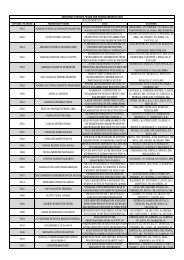immunology of infectious and parasitic diseases - XXXVII Congress ...
immunology of infectious and parasitic diseases - XXXVII Congress ...
immunology of infectious and parasitic diseases - XXXVII Congress ...
You also want an ePaper? Increase the reach of your titles
YUMPU automatically turns print PDFs into web optimized ePapers that Google loves.
Title: VPAC1 GENE POLYMORPHISM IS ASSOCIATED WITH THE<br />
INDETERMINATE FORM OF CHAGAS DISEASE<br />
MARIELLE VALERIO CORREA(PG)(1); MANOEL OTÁVIO DA COSTA<br />
ROCHA(2); NATALIA SATCHIKO HOJO DE SOUSA(PG)(1); KARINE<br />
SILVESTRE FERREIRA(PG)(1); KENNETH JOHN GOLLOB(3,4,6);<br />
WALDEREZ ORNELAS DUTRA(1,3,6); CRISTIANE ALVES DA SILVA<br />
MENEZES(5,6).<br />
(1).Departamento de Morfologia da Universidade Federal de Minas Gerais;<br />
(2).Faculdade de Medicina da Universidade Federal de Minas Gerais; (3).<br />
Center for Infectious Disease Research, SRI International, Menlo Park, CA,<br />
USA; (4). Instituto de Ensino e Pesquisa Programa de Pos-graduação em<br />
Biomedicina e Medicina, Hospital Santa Casa BH; (5). Instituto de Ciências<br />
Exatas e Biológicas da Universidade Federal de Ouro Preto; (6) INCT-DT.<br />
Introduction: Human infection with T. cruzi leads to Chagas disease (CD),<br />
which presents as several different clinical phenotypes ranging from an<br />
asymptomatic form to a severe dilated cardiomyopathy. Host‟s immune system<br />
plays a critical role in parasitemia control; however, exacerbated cellular<br />
response can cause tissue damage. Interactions between the immune, nervous<br />
<strong>and</strong> endocrine systems play an important role in modulating host susceptibility<br />
<strong>and</strong> resistance to inflammatory <strong>and</strong> <strong>infectious</strong> <strong>diseases</strong> through the<br />
homeostasis maintenance <strong>of</strong> cellular response. Vasoactive intestinal peptide<br />
(VIP) is a neuropeptide with a broad distribution in the body <strong>and</strong> exerts a role as<br />
a modulator <strong>of</strong> the homeostasis <strong>of</strong> the immune system through its receptors<br />
VPAC1 <strong>and</strong> VPAC2. Data concerning to VIP or its receptors function in the<br />
scenario <strong>of</strong> CD are lacking in literature. Considering this, <strong>and</strong> the variation in<br />
clinical forms <strong>of</strong> CD, we hypothesized that an aberrant response to VIP could be<br />
related to development <strong>of</strong> different clinical outcomes <strong>and</strong> associated to VPAC<br />
polymorphisms. Thus, the present study aims to analyze if gene polymorphisms<br />
<strong>of</strong> VIP receptors, may be associated with different clinical forms <strong>of</strong> CD.<br />
Methods <strong>and</strong> Results: To assess possible associations between single<br />
nucleotide polymorphisms <strong>of</strong> genes encoding VPAC1 <strong>and</strong> VPAC2 <strong>and</strong> the<br />
development <strong>of</strong> CD, DNA was obtained from oral swabs <strong>of</strong> a cohort <strong>of</strong> 144<br />
individuals (57 patients with dilated cardiomiopathy, 51 patients with<br />
indeterminate form <strong>and</strong> 51 non infected individuals) <strong>and</strong> the evaluation <strong>of</strong><br />
polymorphisms are being performed using Real Time PCR. Statistical analysis<br />
<strong>of</strong> data was performed using the chi(2) likelihood ratio test. The study groups<br />
were tested for Hardy-Weinberg equilibrium comparing the expected with the<br />
observed genotypes frequencies for VPAC1 SNP rs342511 (2234 C/T) (X 2<br />
=0,0079; p=0,9292). Our data showed that patients carrying the T variant for<br />
VPAC1 have four times more chance <strong>of</strong> developing the indeterminate form as<br />
compared to the cardiac form (X 2 = 5, 179; OR= 4,267; p=0,023; IC=0,336-<br />
2,976).



